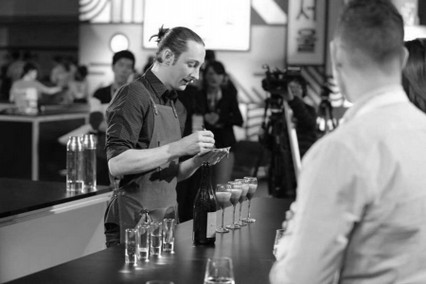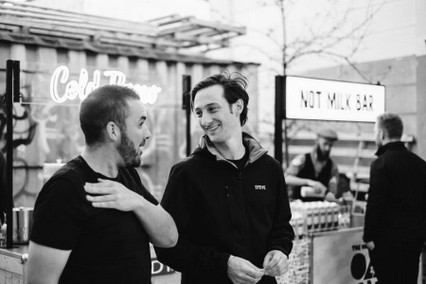Steve Moloney (The Barista League): Coffee Insurrection Hero Chapter #71
Published by Tanya in Coffee Insurrection Hero · 23 May 2023
Tags: Barista, Coffee_Interview, Barista, Specialty_Coffee, Sweden, The_Barista_League
Tags: Barista, Coffee_Interview, Barista, Specialty_Coffee, Sweden, The_Barista_League
1- Introduce yourself: who are you, where are you from, where do you work and what’s your job.
My name is Steve Moloney, i am the founder and CEO of The Barista League as well as Ordna Event Agency – the company that produces The Barista League. I was originally born in Australia but live and work in Gothenburg, Sweden.
2- When and why did coffee become important to you?
I’ve always loved coffee, but before moving to Sweden i worked mostly in restaurants and bars and coffee was mostly just the drink i needed to make it to Uni on time. After i moved to Sweden in 2012 and couldnt get a job in my old career of production management for music and theatre festivals, i found a job in a little cafe and quickly fell down the rabbit hole of specialty coffee.
3- Do you remember the first coffee you had that was more than “just a cup of coffee”?
Ive had a lot of these experiences, the first might have been in the roastery of Love Coffee in Sweden getting to taste their fresh crop ethiopian coffees and them just popping off the cupping table tasting of fruit loops, sherbet, lemon and just thinking – this is totally unlike the coffee i know.
4- What’s your favorite thing about going to work in the morning?
Getting to do so many different tasks and work with so many amazing people around the world. We are super lucky to have carved out this little niche of work in the coffee world where we get to travel, produce events, competitions, game shows and festivals and basically just plan crazy events that we havent seen before in the coffee industry.
5- What’s your favorite brewing method and why?
Im pretty lazy so gotta go with batch brew. When properly dialled in and in a very clean thermos – this can beat any brew method any day of the week.
6- Which is the best coffee you ever tasted?
I am lucky enough to have competed in some world comps and gotten to taste some crazy coffee from some very talented producers and baristas. One that comes to mind was Yoshi’s competition coffee from the Seoul WBC in 2017 – i think it was a Finca Deborah washed Gesha. I dont really drink espresso any more so i think that is a pretty nice ‘last espresso’.

7- Is there a country of origin that you tend to favor coffee from?
Washed Ethiopia – hard to beat.
8- Suggest us a roastery to check (not the one you working at/you use at work).
Morgon Coffee Roasters (Gothenburg)
Swerl (Falkenberg, Sweden)
Solberg & Hansen (Oslo)
Blip (Kansas City)
9- What’s the most important things you’ve learnt while working in the business?
There have been so so many things. Something we talk about all the time is to know WHY you do something. It’s so often, especially with marketing activities or events, where you’re standing there just thinking – why is this here and who is it for? Who made the decision to do it this way? Ive found that this often stems from people not knowing what they want and why they want it – if you know that it’s much easier to stay on track and hit your targets.
You can extrapolate that for a barista competition or a cafe design or even the choice of which coffee you serve – know why you want to do something and then make the decision of how to get there.
10- How your work and the specialty coffee world are coping with Covid and the new challenges for hospitality?
Covid was a very tough time for us – we had to cancel all of our events, which was tough and it was a pretty sketchy two or so years. Luckily it feels like we are mostly out of it and in the recovery stage. I can say though that we learnt a lot of hard lessons and came out a stronger company at the end of it.
11- How do you see the specialty coffee scene in 10 years?
Hopefully bigger but also more mature. Basically, i would love to see more recognition and compensation for the knowledge and skill that specialty coffee professionals build up – from a talented barista to photographers, event planners, and social media managers – often times you get paid as a barista and expected to also manage a staff or take photos for free or run a social media account on the side. In any other business, this is not only a full-time paid position but something that agencies charge exuberant amounts for.
I would love to see more appreciation and the appropriate compensation for these skills and talents both for the traditional coffee production career path as well as supporting roles.
12- Where do you see yourself in 10 years?
No idea. Probably in Sweden, probably still dreaming up crazy event ideas and hopefully able to spend more time and energy on projects that have social and environmental missions over marketing or financial goals.
13- Any last word? Any tip or suggestion you wanna share with someone that want to start this path?
Be nice and make friends with everyone – the industry is very very small and your network (big, small, local or global) is something that can never be replaced by a super-automatic machine or AI generated social media bots.


